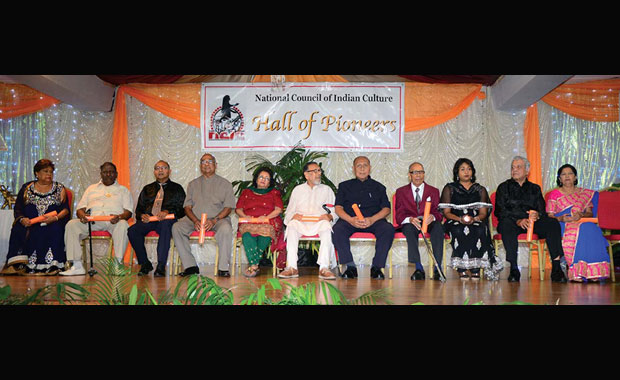NCIC Hall of Pioneers
.jpg) Dr Sharma pointed out that there has been a gradual change, however, as the NCIC grew in stature over the years and became the leading Indian cultural body. “The turning point came with the creation of Divali Nagar, that not only took the Indo-Trinidadian population by storm, but the entire country was literally forced to take stock of the presence of a very important culture that went largely ignored and unrecognized for upwards of 150 years.” “The NCIC is now a well-respected cultural organization that has in the 51 years of its existence grown into a formidable institution. This is due largely to the dedication, loyalty and tireless voluntary labour of its executive, who have not only ensured the growth of the NCIC but also preservation of Indo-Trinidadian culture in our country,” Dr Sharma said. Since the establishment of the Hall of Pioneers about 80 persons have been inducted, as he made an appeal to the public to submit recommendations of potential candidates.
Dr Sharma pointed out that there has been a gradual change, however, as the NCIC grew in stature over the years and became the leading Indian cultural body. “The turning point came with the creation of Divali Nagar, that not only took the Indo-Trinidadian population by storm, but the entire country was literally forced to take stock of the presence of a very important culture that went largely ignored and unrecognized for upwards of 150 years.” “The NCIC is now a well-respected cultural organization that has in the 51 years of its existence grown into a formidable institution. This is due largely to the dedication, loyalty and tireless voluntary labour of its executive, who have not only ensured the growth of the NCIC but also preservation of Indo-Trinidadian culture in our country,” Dr Sharma said. Since the establishment of the Hall of Pioneers about 80 persons have been inducted, as he made an appeal to the public to submit recommendations of potential candidates.
Dr. Sharma said that within recent months the NCIC has completed the first phase of its Heritage Centre which will house an Indo-Caribbean archive, a diaspora library, a cultural research centre and an Indian diaspora museum. “Included in the centre will be the long-awaited Hall of Pioneers which will display one form or other all the biographies of our Pioneers which we have so far compiled and that those will be researched and compiled in the coming years.”
Those inducted in the Hall of Pioneers are: Helen Bhagwansingh (philanthropist and businesswoman), Sam Boodram (classical Indian singer and musician), Henry Tooloom Dindial (classical Indian singer and musician), Dr. Hansley Hanoomansingh (broadcaster, businessman, and former Member of Parliament who became the youngest Parliamentarian in the Commonwealth at the age of 24), Amral Khan (cultural figure and business pioneer), Muhammad Khan (scouts) Seereeram Maharaj Pandey (businessman and entrepreneur), Ajeet Praimsingh (cultural icon, promoter), Ramdeen Ramjattan (comedian) Professor Brinsley Samaroo (historian, professor and former Government Minister), Jit Samaroo (steelband pannist).
Professor Samaroo who spoke on behalf of the inductees, recalled the dismal and inhumane days that the Indian diaspora faced during their arrival in Trinidad and Tobago between 1845 and 1917, when in excess of 148,000 East Indians were brought here from India, principally Uttar Pradesh and Bihar to work on enhancing the agricultural capacity of the then colony of Trinidad. They were not even allowed to vote in elections until 1946. He spoke of the rich philosophical, humanitarian and entrepreneurial capacity of the Indian diaspora, then and even today, where over 45 per cent of the population of 1.3 million people are of East Indian extraction.











Comments.